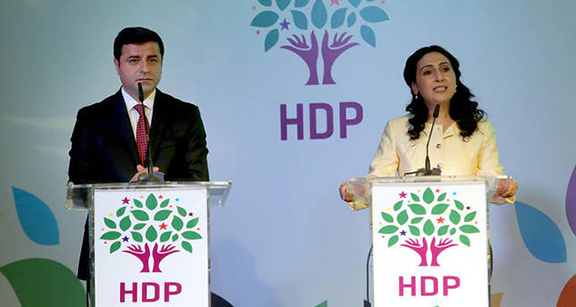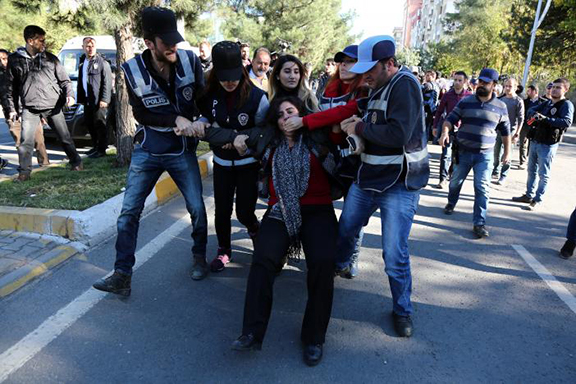
HDP Co-Chairs Figen Yuksekdag (right), Selahattin Demirtas, and 13 HDP lawmakers were arrested in Diyarbekir on Nov. 3, 2016 (Photo: Doğan News Agency)
DIYARBEKIR, Turkey (Reuters)—Turkish authorities arrested the leaders of the country’s main pro-Kurdish opposition party in a terrorism probe on Friday, drawing European and U.N. condemnation of a widening crackdown on dissent under President Recep Tayyip Erdogan.
Selahattin Demirtas and Figen Yuksekdag, co-leaders of the Peoples’ Democratic Party (HDP), were jailed pending trial after being held in overnight raids, officials said. Ten other HDP lawmakers were also detained, although some were later released.
The arrest of elected members of parliament’s third largest party, and the detention or suspension of more than 110,000 officials since a failed coup in July, may “go beyond what is permissible,” the U.N. human rights office said.
Germany and Denmark summoned Turkish diplomats over the Kurdish detentions, while European Parliament President Martin Schulz said the actions “call into question the basis for the sustainable relationship between the EU and Turkey.”
“Turkey is a nation of laws, nobody has preferential treatment before the law … What’s been done is within the rule of law,” Prime Minister Binali Yildirim told reporters. The HDP lawmakers were arrested after they refused to give testimony in a probe linked to “terrorist propaganda.”
“Politics can’t be a shield for committing crimes,” he said.
Hours after their detentions, a car bomb planted by suspected Kurdish PKK militants killed nine and wounded more than 100 near a police station in the southeastern city of Diyarbakir where some of the lawmakers were being held.
The HDP, which made history last year by becoming the first Kurdish party to win 10 percent of the vote and enter parliament, said the detentions risked triggering civil war.
In a video message on a website close to the PKK, one of the militant group’s top commanders, Murat Karayilan, said the group would intensify its three-decade old armed struggle against Turkey and called on Kurds, the country’s largest minority, to react.
INTERNATIONAL CONCERN
The arrests of elected lawmakers from the HDP, which won more than five million votes at the last general election, heightened concern among Western allies about the political direction of Turkey, a NATO member and a buffer between Europe and the conflicts in Syria and Iraq.
The government introduced a nationwide state of emergency after the failed July 15 coup which gave it broad powers to round up suspects linked to the putsch. More than 110,000 civil servants, soldiers, police, judges and other officials have been suspended or detained, as have journalists.
The authorities have also used the emergency powers to round up pro-Kurdish opposition activists and politicians, including Diyarbakir’s joint mayors, who were detained late last month, and has closed all major Kurdish media outlets.
Erdogan and senior government officials have increasingly discussed reintroducing the death penalty in the wake of the failed coup, and earlier this week journalists from a leading secularist opposition newspaper were detained.
“Very bad news from Turkey. Again. Now HDP members of parliament are being detained,” the European Parliament’s Turkey rapporteur, Kati Piri, said on Twitter of a country that is seeking membership of the EU.
EU foreign policy chief Federica Mogherini said she was “extremely worried” by the arrests and had called a meeting of EU national envoys in Ankara.
Turkish Foreign Minister Mevlut Cavusoglu accused EU member states of supporting the PKK and dismissed the bloc’s criticism as “unacceptable.”

Police detain Sebahat Tuncel, co-chair of the pro-Kurdish Democratic Regions Party (DBP), during a protest against the arrest of Kurdish lawmakers, in Diyarbakir, Turkey on Nov. 4, 2016. (Photo: Reuters/Sertac Kayar)
SOCIAL MEDIA BLOCKED
Southeastern Turkey has been rocked by political turmoil and violence for more than a year after the collapse of a ceasefire with the PKK, deemed a terrorist organization by the United States and European Union as well as Turkey.
Erdogan and the ruling AK Party accuse the HDP of links to the PKK. The HDP denies direct links and says it is working for a peaceful resolution of the Kurdish conflict.
Access was “throttled” to social media including Twitter, WhatsApp, YouTube and Facebook – making the sites so slow they were effectively impossible to use – and a ban imposed on media coverage of the car bomb. Asked about the measures, Yildirim said access would return to normal “once the danger is removed.”
The lira hit a new low against the dollar of 3.14 after the arrests, while the cost of insuring Turkish government debt against default hit its highest in over a month.
“JUDICIAL THEATER”
In a statement on Twitter, still accessible in Turkey through virtual private networks (VPN), the HDP called for the international community “to react against the Erdogan regime’s coup,” while party spokesman Ayhan Bilgen described the detentions as an attempt to provoke a civil war.
“I will not hesitate to be held accountable in front of a fair and impartial judiciary. There is nothing I cannot answer for,” Demirtas said in a statement to the prosecutor, which was shared by HDP lawmaker Besime Konca.
“But I refuse to be an actor in this judicial theater just because it was ordered by Erdogan, whose own political past is suspicious,” he said.
Police also raided and searched the party’s head office in central Ankara. Police cars and armed vehicles had closed the entrances to the street of the HDP headquarters.
A group of protesters chanting slogans tried to reach the party offices, but were stopped by police before they could enter the street, a Reuters witness said.
The HDP is the third-largest party in the 550-seat Turkish parliament, with 59 seats. Parliamentarians in Turkey normally enjoy immunity from prosecution, but the immunity of many lawmakers, including HDP deputies, was lifted earlier this year.
Source: Asbarez
Link: Europe, UN Condemn HDP Arrests in Turkey
